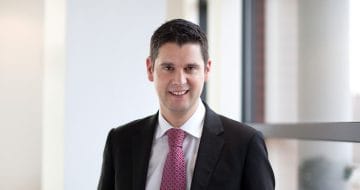Squire Patton Boggs partner Michelle Adams didn’t get the A-Level grades she’d hoped for and started training at the peak of the 2008 financial crisis; here she talks to Legal Cheek Careers about navigating choppy waters to get to where she is today

Commercial property litigator Michelle Adams’ advice for prospective lawyers is to develop “a niche within a niche”. The Squire Patton Boggs partner is head of Birmingham real estate litigation at the global law firm, and a specialist in telecoms.
“Property litigation is a niche, and telecoms within property litigation is a niche within a niche,” she says. “That niche within a niche has helped me become a partner. The money is made in these particular specialisms, so people should think about developing niche areas of practice. That applies across the board, for example, we have a defamation and reputation management lawyer at the firm who has a very busy practice specialising in matters relating to Instagram and Twitter.”
As head of real estate litigation, Michelle is growing the practice and expanding the team. The telecoms side of the business, in particular, is booming due to the proposed 5G rollout, regulatory changes and ongoing drive to improve the UK’s infrastructure.
So, what does a commercial property litigator do from day to day? Michelle’s practice is mainly disputes-related but involves some interpretative transactional work. As well as court and tribunal appearances, usually in the form of virtual or telephone hearings during the pandemic, Michelle advises clients on a range of commercial and residential property issues including insolvency, possession, rent arrears and leases. The work varies from representing clients in possession cases to hurtling around in a golf buggy checking access points on a golf course for a lease dispute.
“We have just finished a tough few weeks working round the clock and at weekends, but sometimes it is nine to five,” Michelle says. “Lawyers need to be flexible. Our competitors are going to be excellent lawyers, that goes without saying, so it’s about what sets you apart. It’s about maintaining relationships and listening to clients. Every client is unique and different, and taking the time to meet with them and build a relationship is very important.”
“I do a fair amount of public speaking at public seminars, giving clients information about general issues and keeping them up-to-date with developments,” she continues. “I have given numerous training sessions to clients during Covid, for example, in the surveying industry. Business development is a big part of the job. I’m an avid golfer and I’ve been golfing with clients over the past 12 months — it sounds a cliché to say business gets done on the golf course, but it definitely does. If you have five hours together, playing a round of golf, that’s invaluable. It’s good to have a mixed bag of interests though — I also love live music and we’re taking clients to gigs next year. It’s about getting to know what clients like.”
She finished her training contract at Hammonds, Birmingham, in 2010, took a position as associate at Eversheds in June 2011 and moved to Squire Patton Boggs in October 2016 to become a senior associate, was made a director in February 2020 and partner in May 2021.
While Michelle’s made fast progress, however, she’s had to navigate some choppy waters along the way. “My A-Levels went wrong — I did not apply myself,” she says. “But I found a place through clearing to do environmental science at Manchester University, which I really enjoyed.” Michelle looked at environmental law for her dissertation, comparing the English and Australian systems. Intrigued to find out more about the legal profession, she went to a law careers fair at the university, where she was encouraged by the Hammonds representative to apply for the firm’s vacation scheme. She was successful, and went on to do her GDL and LPC at Nottingham Law School.
She started her training contract at a difficult time, however — 2008, year of the global financial crash — Lehman Brothers went under, RBS had to be bailed out, customers queued around the block to take their money out of Northern Rock, and the markets panicked. Businesses tightened their belts and, by 2010, the jobs market for newly qualified solicitors had reduced. The firm only retained three out of its ten trainees, and none in the areas she wanted to do.
“People coming through now will relate. It’s a difficult market again, with the impact of Covid, Brexit and economic uncertainty being felt across the board,” says Michelle. “Our insolvency work is accelerating at the moment, which is exactly what was happening back in 2010. For most people in my situation back then, it’s a bit of a nightmare. My advice is to keep yourself employed, even if it’s not completely what you want to do. Remember you’re just getting started. Keep focused on what you want to do.”
Michelle worked as a paralegal for the next year, first in Hammond Hausmann, the firm’s Paris office, for five months on an arbitration. This was “challenging”, due to Michelle’s lack of French. A maternity-leave paralegal role then came up at her current firm, which she took for six months, until one of the partners told her he’d heard of an associate job going at Eversheds, in Birmingham. On this she says:
“It was a big change because the culture is very different, but I loved it and they really helped me cut my teeth on property litigation. While there, I went to Leeds to work on a financial dispute, where we were working in an independent capacity on a mis-selling scandal, as I had experience of taking witness statements. It was meant to be a three-month stint but turned into two years. Then a vacancy came up at Squires and I was able to boomerang back to the firm in a senior associate position, in 2016.”
Squires values people who think creatively and suggest ideas. Another draw is its attitude to pro bono work, which it counts as chargeable hours. Michelle has volunteered at Birmingham Legal Advice Clinic on housing matters throughout her career, these days acting in a supervisory role. “You have people coming in with terrible difficulties, and you can make a real difference to their lives,” she says. “The variety of the work you will do there will stand you in good stead as a trainee so it is something I would definitely recommend.”
Summing up, therefore, prospective commercial property lawyers should look to gain experience at legal advice clinics, try to develop a niche within a niche, listen to their clients, be sure to maintain good working relationships and, if they hit a stumbling block, try to keep themselves working and keep asking around for opportunities.
Michelle Adams will be speaking at ‘What corporate lawyers do — with Goodwin Procter, Squire Patton Boggs, DWF and BARBRI’, a virtual student event taking place on Tuesday 26 October. You can apply to attend the event, which is free, now.
About Legal Cheek Careers posts.


